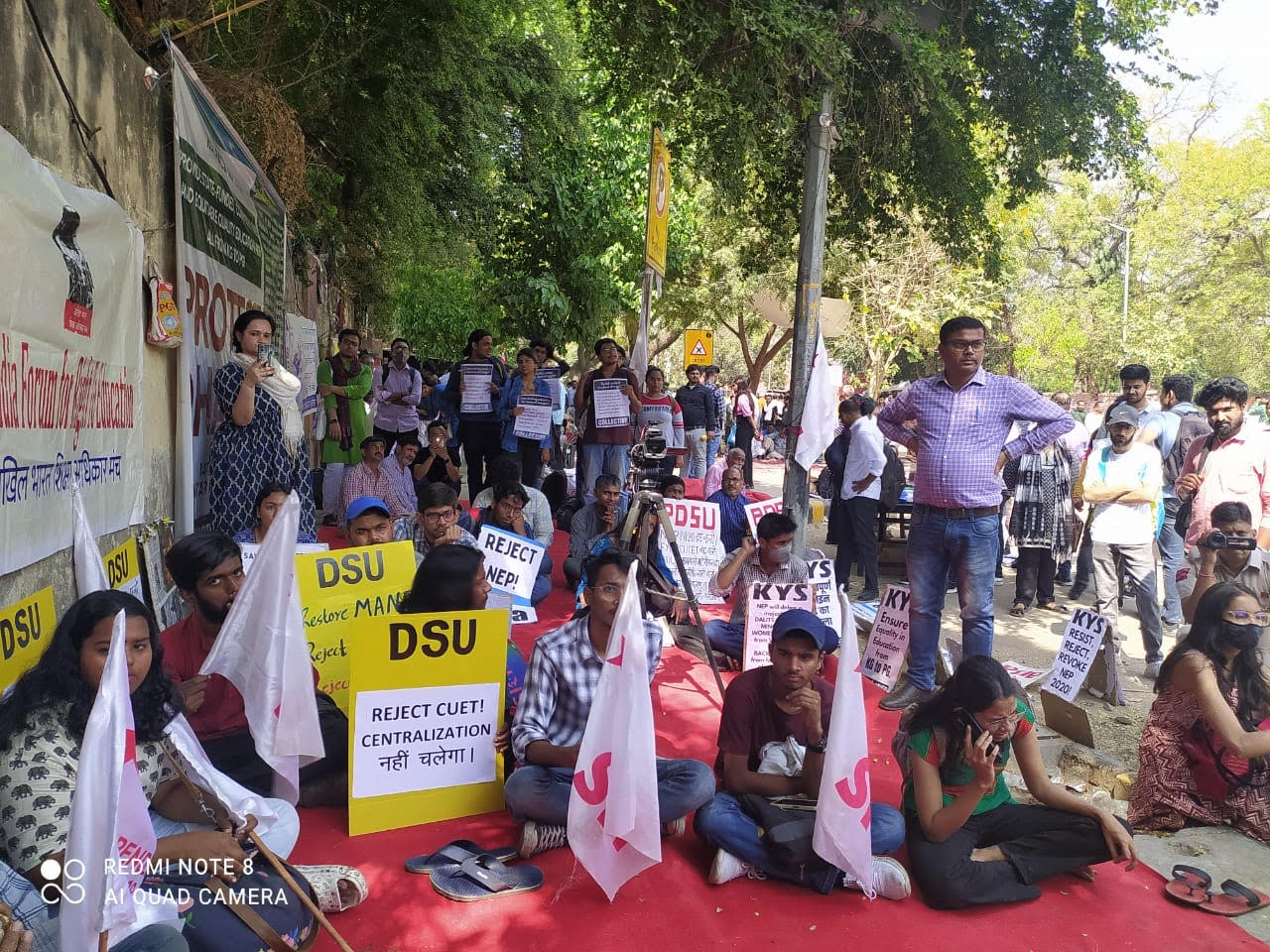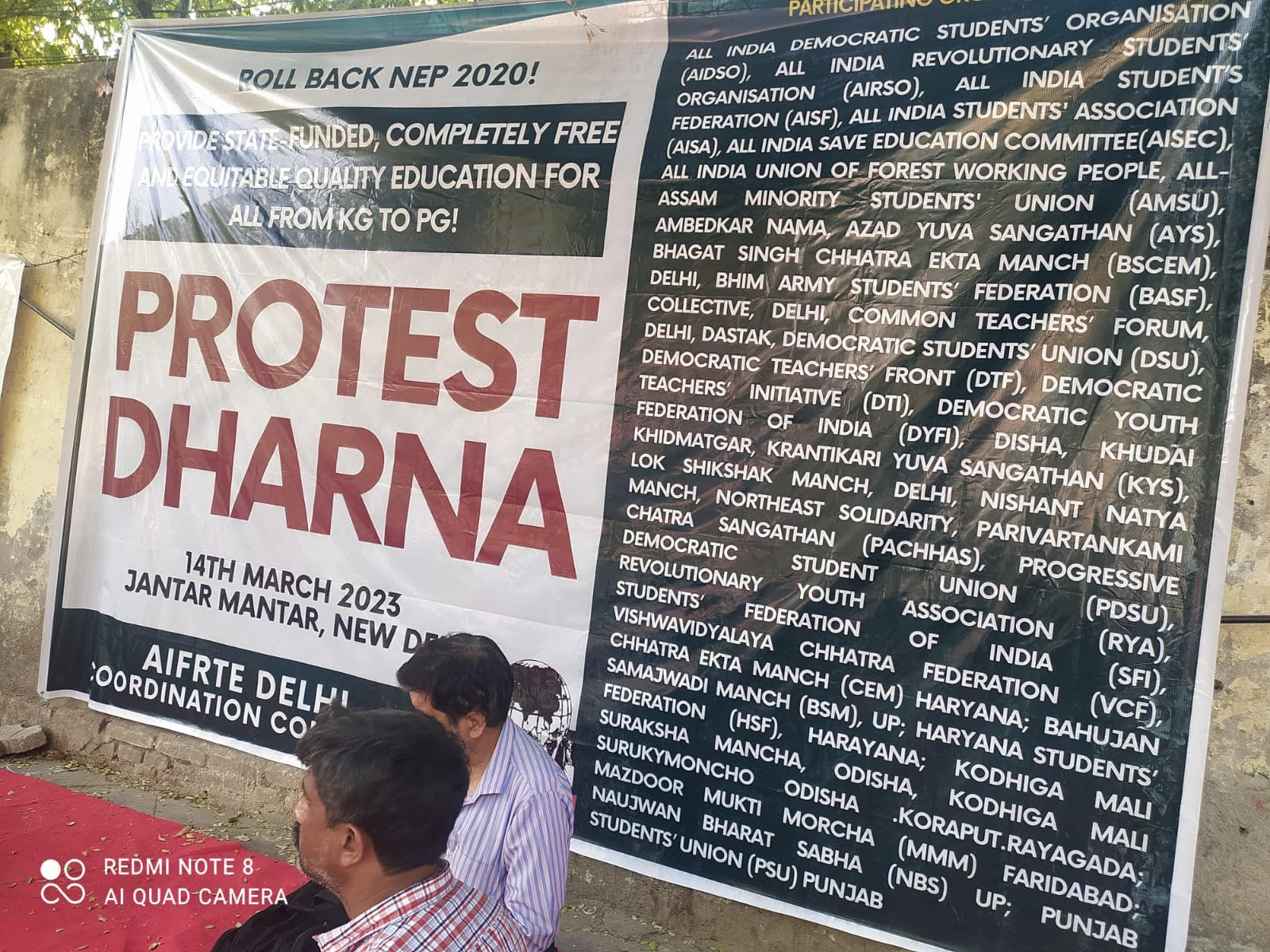
The All India Forum for the Right to Education (AIFRTE) held a vibrant protest against the hastily implemented New Education Policy (NEP) 2020 that has undermined the Constitutional provisions of Article 21A and 46 of the Indian Constitution, allowed the State to withdraw from its constitutional obligations to all citizens especially SC, STs and Minorities. The sharp cuts in recently introduced scholarships for marginalised sections have further pushed away the hard earned access to education and higher education for all.
Photographs of the dharna may be seen here:

The detailed statement of the AIFRTE is below:
With the coming in of NEP 2020, the process of privatization and commodification of education which had begun in the preceding decades has taken on a new and rapid form. From school mergers, to rapid de-funding of higher education institutions, to roll back of different scholarship schemes in school and higher education, accessible education is today being made a dream for the vast majority of this country.
Demands of the Forum:
- Pre-Matric Scholarships for SC/ST/Minority/Girl students be reinstated. Not only is this scholarship essential to aide majority of students in completion of education, it is also key in preventing children from marginalized and oppressed backgrounds from being pushed into child labour.
- Extend scholarship to oppressed and marginalized sections of students up to class 12.
- School Teacher vacancies along with principal positions in schools are filled on a permanent basis. No contract based appointments in our education institutions.
- Scrapping of the school merger program which has been reinforced through the NEP 2020, with lakhs of schools already being shut in areas which need educational institutions more urgently than ever before.
- Of the children admitted in class 1, only about six percent of STs, eight percent of SCs, nine percent of Muslims and ten percent of OBCs are able to complete schooling till class 12. This means that more than 90% of these sections already stand outside the ‘shrinking’ public education system. Mergers need to be stopped, and more schools and teacher appointments along with scholarships are required to bridge this enormous gap.
- There needs to be uniformity in school syllabi across boards, with all schools teaching all subjects to students.
- Children’s nutritional needs ought to be met in school.
In Higher Education:
- Withdraw CUET as the mode of getting admitted to undergraduate programmes. CUET’s pattern places CBSE students at a massive advantage over other state boards, which has been reflected in the rise in CBSE intake this year in DU.
- Funding of higher education institutions must be undertaken through grants and not the loan model. Loan based funding will push expenses on to students who will themselves have to take up loans to pursue higher education, a model which has already been proven to have disastrous consequences, as is evident from the United States experience.
- Scholarships for marginalized students need to be increased. In the past few years, scholarship schemes have been officially discontinued or made ineffective in insidious ways. There has been a massive downward trend in funding for different scholarship schemes catering to SC/ST, OBC and minority students. If we look at the pre-matric scholarship scheme for students from Scheduled Castes (SC), offered by the Ministry of Social Justice and Empowerment (MSJE), its funding has been cut by Rs 225 crore (from Rs 725 crore in 2021-22 to Rs 500 crore in 2022-23). Similarly, allocation for the National Fellowship for SC students has been cut by Rs 127 crore, from Rs 300 crore in 2021-22 to Rs 173 crore in 2022-23.
- The allocation for the post-matric scholarship for Other Backward Classes (OBC) students has been cut by Rs 217 crore, from Rs 1,300 crore in 2021-22 to Rs 1,083 crore in 2022-23. For the Scholarships for Higher Education for Young Achievers Scheme (SHREYAS) for SC students, it has been reduced from Rs 450 crore in 2021-22 to Rs 364 crore in 2022-23. The Rajiv Gandhi Fellowship for Students with Disabilities has also seen rapid decrease in seats allocated each year.
- Increase in budgetary allocation on education as per the need and requirements of the sector to enable free, quality and universal education.
- The Right to Unionise must be guaranteed to students as well as all stakeholders of the university. Running universities like private enterprises through the Board of Governors goes against the idea of public education.
- These changes are required even more in present times, where inequality is at its highest historically, particularly after the Covid-19 crisis. Since the pandemic began in Nov 2022, billionaires in India have seen their wealth surge by 121. Just five percent of Indians own more than 60 percent of the country’s wealth while the bottom 50 percent of India’s population possess only three percent of wealth.
In multiple ways the right to education is being attacked ceaselessly by the ruling regime. Since the rise of BJP in power, there has been a clear indication that the Government would no longer support education as a fundamental right, as it is enshrined in our constitution under article 21A.
“The scrapping of these scholarships is also violative of article 46 of the constitution which ensures the promotion of the educational interests of SC,ST OBC, minorities, women and disabled persons.
“The faulty and flawed design of NEP 2020 along with it’s hasty implementation which meant to openall educational institutions to private entities need to be examined and necessarily linked with the dilution and scrapping of these scholarships along with the promotion of the process of closer and merger of the school at various levels.
“The turn towards privatization under NEP is evident further when we look at the case of non-NET fellowships for research scholars which have seen reduced allocation at the level of departments across universities.
“These changes and rapid de-funding from scholarships is occuring at a moment when fees are simultaneously being hiked and the overall cost of education is rising everywhere. It follows the doctrine of making education a saleable commodity which has framed education policy since the early 2000s and is now being even more rapidly implemented.
“All these attacks seemed to affect only the SC, ST or minorities, especially the Muslims, against whom the Government rides on populist support. However, this is merely a blueprint for the large-scale overhaul in education being brought about through the NEP.
The Modi Government is trying to privatise the education sector, leading to huge increments in fees and limited seats across schools and colleges; a concern no longer limited to minorities and affecting all.”
Related:
51 Reasons to say goodbye to NEP 2020: AIFRTE
ABVP gang run riot disrupt academic session on Constitution & NEP: Odisha
Tripura: Hundreds Join SFI, TSF Jatha Against NEP, ‘Save India, Save Constitution’